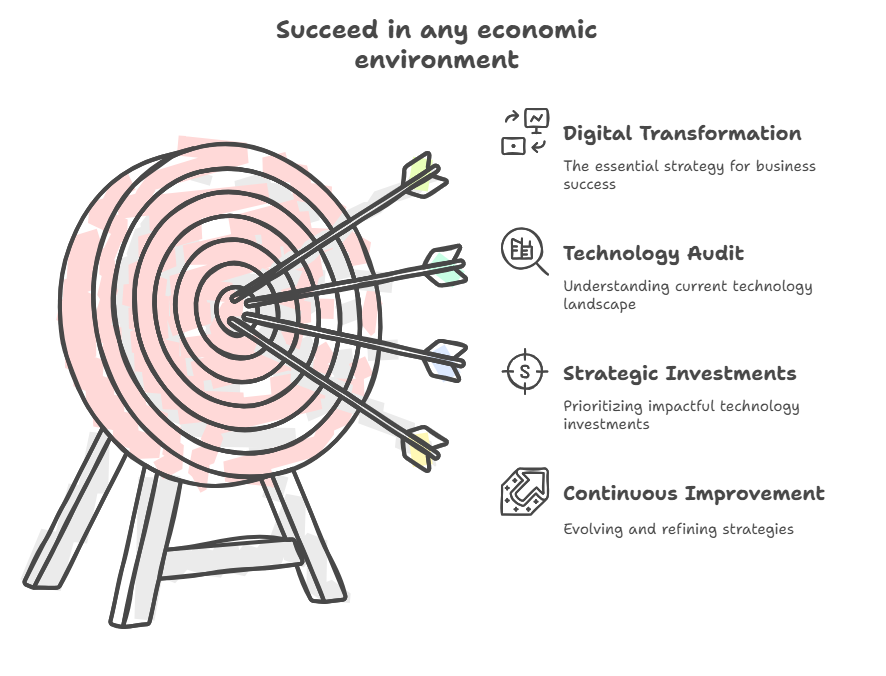After surviving the Stormy Daniels affair, Trump is now creating stormy economic conditions for us all.
Dan Coleby
Who knows exactly where the current situation will lead in terms of global recession, but right now it's clear that one individual can send ripples through global markets, creating uncertainty and challenging conditions for businesses worldwide. I recently returned from Seattle, and while the overall sentiment there felt like business as usual, beneath the surface there's a clear sense that planning and caution are essential.
The great thing about technology investment is that it makes sense regardless of the economic climate: when times are good, technology can turbo-charge your success. When conditions become tough, digital transformation is precisely the powerful tool organisations need to achieve more with less, cutting costs without sacrificing capability.
Right now, we're entering a golden era for technology, particularly AI. The emergence of Generative AI, and especially the potential of autonomous and semi-autonomous agents, is creating unprecedented opportunities. Recent research by Forrester and Microsoft highlights this transformative potential, finding individuals empowered with AI significantly outperform entire teams without AI tools. We're not just talking incremental improvements; we're talking productivity increases of more than 10 times.
But let's be clear: the route to success through digital transformation isn’t solely about AI. Across the board, technology is enabling organisations to reinvent themselves and thrive.
Broader Digital Transformation Opportunities
Digital transformation isn't just about adopting the latest trends in AI. It's fundamentally about improving business processes and user experiences by leveraging technology such as cloud migration, enhancing cybersecurity, improving collaboration through modern workplace tools, and harnessing data analytics for smarter decision-making.
Cloud Migration and Flexibility
I'm always surprised how many workloads companies still have on-premises. Migrating to cloud solutions provides organisations with flexibility, scalability, and resilience, as well as significantly reducing the management effort. Whether it’s streamlining costs through pay-as-you-go models or quickly scaling infrastructure to meet fluctuating demands, cloud services offer substantial advantages during uncertain economic conditions. Security capabilities of public cloud services are generally also far more capable than legacy on-premises solutions, and reducing cyber risk is always a significant line in any technology business case.
Enhanced Cybersecurity
In a digitally interconnected world, strengthening cybersecurity is crucial. Increased remote working, digital interaction and the increasing use of AI raise new security challenges. Organisations investing proactively in cybersecurity not only protect themselves against breaches but also build trust with customers and stakeholders which is essential during times of uncertainty.
Data-Driven Decision Making
Effective data analytics can turn vast amounts of organisational data into actionable insights, driving smarter, more informed decisions. Businesses leveraging analytics platforms, such as Tableau, Power BI or Microsoft Fabric, are able to spot trends, predict customer needs, and respond rapidly, thus gaining competitive advantage even in turbulent times.
Improved Collaboration and Remote Working
Modern collaboration platforms such as Microsoft Teams and Slack have reshaped how organisations operate. Embracing digital collaboration tools improves productivity, facilitates seamless communication, and supports remote and hybrid working models, ensuring business continuity regardless of external economic disruptions.

How to Begin Your Digital Transformation Journey
-
Conduct a Technology Audit: Understand your current technology landscape and identify gaps.
-
User Research and Business Needs Analysis: Understand deeply the needs and challenges faced by your users and the organisation. User research used to be the cornerstone of successful strategy, but in the era of AI, users often don’t fully realise what technology can achieve and need inspiration from IT leaders to explore new possibilities.
-
Draw Inspiration from Technology: Actively explore emerging technologies and identify potential use cases that align with your strategic goals.
-
Prioritise Strategic Investments: Focus first on areas that offer the greatest immediate impact or long-term value.
-
Invest in Training and change management: Equip your teams with the necessary skills to leverage new technologies effectively.
-
Implement Incrementally: Avoid large, risky transformation. Adopt technologies progressively, learning and adjusting as you go.
Embrace Continuous Improvement
Digital transformation is not a one-time event; it's a continual evolution. Stay adaptable, seek regular feedback, and remain open to refining strategies based on real-world experiences.
Now is the Time to Act
Digital transformation isn't just desirable, it's essential. Leaders who proactively invest in technology today will position their organisations for lasting success, regardless of the economic climate.
Thank you for reading this edition of IT Strategy Matters. Please share with colleagues who might benefit.
Until next time, remember: IT strategy matters!
Dan – The IT Strategy Coach
Might I be able to help you?
Click here to express interest in our upcoming online courses and coaching programmes.
Click here to enquire about a bespoke engagement with The IT Strategy Coach.
IT Strategy Matters
Newsletter from The IT Strategy Coach, sharing thoughts, ideas and IT strategy community insights. Sign up here! Note that you will receive an email asking you to confirm your subscription. If you don't get this, check your Junk email folder!


Responses